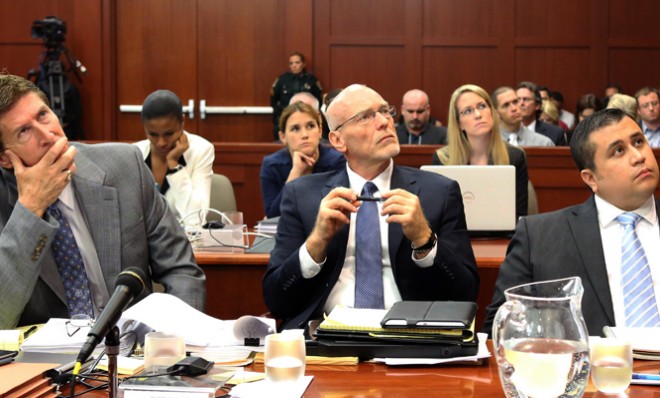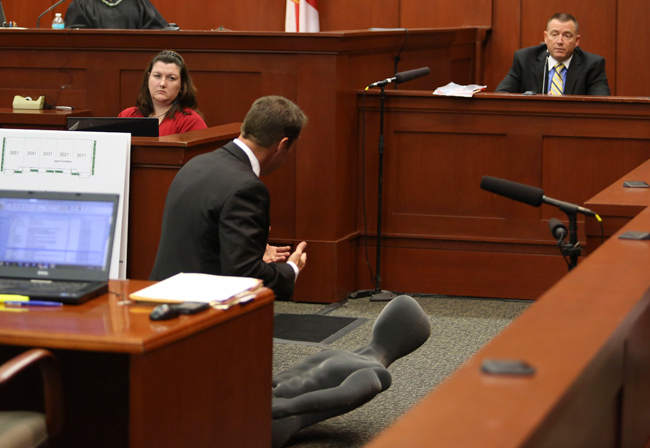George Zimmerman's case goes to jury: 5 key moments from the trial
The jury begins deliberations as the prosecution and defense finish their closing arguments

On Friday, the defense team gave its closing arguments in the trial of George Zimmerman, who is accused of second-degree murder for shooting 17-year-old Trayvon Martin as he walked through a gated community in Sanford, Fla., on Feb. 26, 2012. Zimmerman has admitted to killing Martin, but said he did so in self-defense.
Defense attorney Mark O'Mara argued that the prosecution, which has to show that Zimmerman had intent to kill and acted with a "depraved mind, hatred, malice, evil intent or ill will," didn't prove that Zimmerman was guilty beyond a reasonable doubt.
"If it hasn't been proven, it's just not there," O'Mara said. "You can't fill in the gaps. You can't connect the dots. You're not allowed to."
The Week
Escape your echo chamber. Get the facts behind the news, plus analysis from multiple perspectives.

Sign up for The Week's Free Newsletters
From our morning news briefing to a weekly Good News Newsletter, get the best of The Week delivered directly to your inbox.
From our morning news briefing to a weekly Good News Newsletter, get the best of The Week delivered directly to your inbox.
(MORE: The George Zimmerman trial: A day-by-day recap)
In his rebuttal, prosecutor John Guy portrayed Zimmerman as a wannabe cop who racially profiled Martin and lied about pulling his gun in self-defense.
"The defendant didn't shoot Trayvon Martin because he had to, he shot him because he wanted to," Guy said. "That's the bottom line."
The case is now in the hands of six jurors, who will also consider a lesser charge of manslaughter. Here are some of the key moments they witnessed over the last three weeks:
A free daily email with the biggest news stories of the day – and the best features from TheWeek.com
1. The knock-knock joke
The trial started on an awkward note as defense attorney Don West told a knock-knock joke about how difficult it was to find impartial jurors:
Knock knock.Who's there?George Zimmerman.George Zimmerman who?Good, you're on the jury.
The joke fell flat and quickly became fodder for late-night comedians like John Oliver at The Daily Show.
2. The 911 call
Nothing in the trial was parsed more closely than a 911 call that captured audio of the struggle between Martin and Zimmerman. The prosecution brought out several witnesses — including Martin's mother, father, and brother — who claimed that the voice yelling for help belonged to Martin.
"I heard my son screaming," Sybrina Fulton, Martin's mother, insisted to prosecutor Bernie de la Rionda.
The defense brought out multiple witnesses who claimed the voice belonged to Zimmerman, including his mother, several of his friends, and a co-worker. "Definitely, it's Georgie," said Sondra Osterman, whose husband had earlier called Zimmerman his "best friend."
3. Rachel Jeantel's testimony
Rachel Jeantel, who was talking with Martin on the phone right before the shooting, provided some of the most riveting testimony of the trial, and spent seven hours on the witness stand. The 19-year-old Jeantel told prosecutors that Martin told her a "creepy-ass cracker" was following him and recounted this exchange before the call was disconnected:
Martin: "What are you following me for?"Man's voice: "What are you doing around here?"(A loud "bump").Martin: "Get off, get off."
The cross-examination by the defense team got heated as West questioned Jeantel's account of what happened and accused her of not calling the police after the phone was disconnected because she thought Martin had instigated the fight.
"That's why you weren't worried," West said. "That's why you didn't do anything because Trayvon Martin started the fight, and you knew that."
"No sir!" Jeantel replied. "I don't know what you're talking about."
4. The foam dummy

The case took a strange turn when Guy straddled a life-sized foam mannequin to make the claim that Zimmerman would have had trouble pulling his handgun from his pocket, which would contradict the defense team's story that Zimmerman retrieved his gun only after being attacked by Martin.
O'Mara also got on top of the foam dummy, asking public safety consultant Dennis Root whether it was possible that Zimmerman could have reached around Martin to get his gun, to which Root replied "Yes, sir."
5. Zimmerman's silence
After a testy exchange between the defense team and Judge Nelson, Zimmerman decided that he would not testify. That gave the defense the advantage of letting Zimmerman share his story with jurors — in the form of recorded interviews with the police and a clip from Sean Hannity's Fox News show, both played earlier in the trial — without leaving him exposed to cross-examination by the prosecution.
Keith Wagstaff is a staff writer at TheWeek.com covering politics and current events. He has previously written for such publications as TIME, Details, VICE, and the Village Voice.
-
 5 chilling cartoons about increasing ICE aggression
5 chilling cartoons about increasing ICE aggressionCartoons Artists take on respect for the law, the Fourth Amendment, and more
-
 Political cartoons for January 24
Political cartoons for January 24Cartoons Saturday's political cartoons include 3D chess, political distractions, and more
-
 Ryanair/SpaceX: could Musk really buy the airline?
Ryanair/SpaceX: could Musk really buy the airline?Talking Point Irish budget carrier has become embroiled in unlikely feud with the world’s wealthiest man